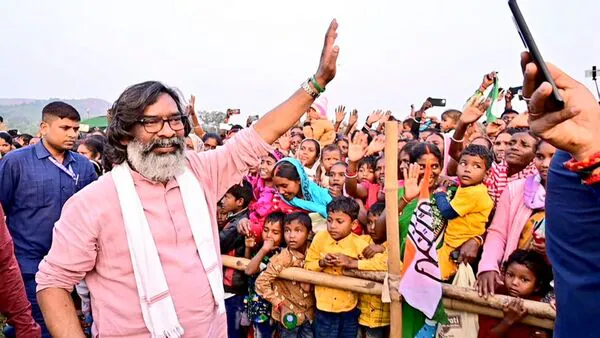How JMM Triumphed in Jharkhand; Why BJP’s Polarisation and Infiltration Claims Fell Flat

Poonam Masih, TwoCircles.net
The results of the Jharkhand Assembly elections have surprised everyone. The Jharkhand Mukti Morcha (JMM)-led INDIA alliance secured comfortable a majority, winning 56 seats, while the Bharatiya Janata Party (BJP)-led National Democratic Alliance (NDA) managed only 24. The NDA’s ally, the All Jharkhand Students Union (AJSU), could win only a single seat. This victory is being credited to Chief Minister Hemant Soren and his wife and JMM’s star campaigner Kalpana Soren, who ensured that BJP’s Hindutva agenda did not prevail.
The JMM government has been formed for the second consecutive term in Jharkhand. Making multiple announcements and openly playing communal card, the BJP had put in significant effort to secure a victory in the state after the party’s win in Haryana. Prime Minister Modi, Uttar Pradesh Chief Minister Yogi Adityanath, Union Home Minister Amit Shah, Assam Chief Minister Himanta Biswa Sarma and Union Agriculture Minister Shivraj Singh Chouhan were all involved in campaigning. However, despite a series of hate speeches, the BJP could not secure a victory. There are several reasons behind this defeat, which are worth exploring.
Mayya Samman Yojana
Three months before the assembly elections, the state government introduced a financial assistance program for women, offering Rs 1,000 per month. Two installments were distributed before the election. In response, the BJP proposed an economic assistance plan under the ‘Gogo Didi Yojana’, which promised Rs 2,100 per month to both mothers and daughters. After the BJP’s announcement, the JMM raised the Mayya Samman Yojana benefit to Rs 2,500 per month starting December. This scheme gained considerable traction among women and led them to vote for the JMM. States that have implemented similar schemes for women’s financial aid in previous elections have seen decisive victories.
JLMK’s Impact on Votes
A major factor contributing to BJP’s loss was the rise of the Jharkhand Loktantrik Kranti Morcha (JLMK), which was formed just two months before the elections. Led by Jayaram Mahato, the party was able to shift the Kurmi community’s vote in one direction. It directly affected the AJSU. As a result, AJSU President Sudesh Mahato lost his seat. In several constituencies, JLMK candidates placed second, damaging both BJP and AJSU. Traditionally, the Kurmi community’s votes have been aligned with the NDA.
In some areas, the shift in votes was significant. For example, in the Chandanakiyari assembly seat, BJP’s Leader of Opposition Amar Kumar Bauri came third. JMM’s Umakant Rajak secured 90,027 votes, while JLMK’s candidate received 56,294 votes and the BJP got 56,091. Without the JLMK in the race, this seat would likely have gone to the BJP.
A similar trend was seen in constituencies like Bermo, Sindri and Ichagadh.
Rejection of Politics of Polarisation
As in previous elections, the BJP attempted to rally the Hindutva narrative in Jharkhand but failed to make it resonate with voters. Slogans like ‘batenge to katenge’ (divided we fall, united we stand) and ‘ek hain to safe hain’ (we are safe till we are united) did not gain traction. The state’s population is predominantly tribal, with nearly 26% of voters belonging to this community. After tribals, the Kurmi (Mahato) and Muslim populations hold significant numbers.
The BJP tried to polarise voters in the urban areas and the Santhal Pargana region by raising concerns about alleged infiltration of Bangladeshi nationals and marriages between tribals and “outsiders”. The saffron party’s star campaigners, including Prime Minister Modi and Chief Minister Sarma, targeted Muslims in Santhal Pargana and labeled them as “Bangladeshi infiltrators”.
They claimed that if the BJP came to power, they would expel the infiltrators. However, the JMM stood accused of offering refuge to infiltrators in Jharkhand.
In Santhal Pargana, posters read, “Do we want to settle infiltrators or protect tribals?” Kalpana Soren responded to the allegation, “If there is infiltration in Jharkhand, the central government is responsible. Jharkhand’s borders are not international.”
Another issue raised in Santhal Pargana was the marriages of tribal women. BJP leaders alleged that “infiltrators” were marrying tribal women and taking over their lands. This was a hot topic, particularly when BJP District President Renu Murmu raised it. However, Murmu eventually joined the JMM after being denied a ticket. And this is how, the issue was sidelined.
Despite BJP’s efforts to polarise the vote, the strategy failed. In the Santhal Pargana region, which has 18 seats, 17 were won by the INDIA alliance. The JMM alone had secured 11 of them. In 2019, the JMM had won only seven seats in the region.
The BJP also focused on the Rajmahal seat in Sahibganj district and claimed a high level of infiltration there. However, BJP’s two-time incumbent Anant Ojha lost the seat to JMM’s T Raja.
The Demand for Sarna Code
The demand for the Sarna religion code, which has been ongoing for a long time, proved to be another key issue in the election. In 2022, tribal groups from different parts of Jharkhand had gone to Jantar Mantar in Delhi to demand its implementation by the central government. This demand directly benefited the JMM in the election.
Recognising the increasing support for Sarna, the JMM included it in its manifesto and effectively communicated that the state government had passed it in 2020, but the central government had yet to implement it. This caused discontent among the tribal communities. As a result, the JMM saw an increase in support and secured more seats than in previous elections.
